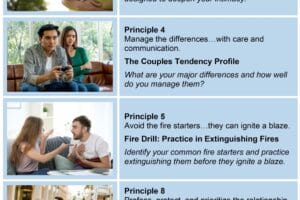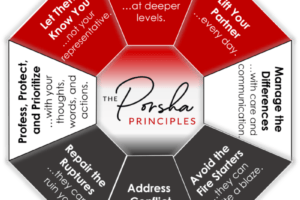Who is the Fire Starter in Your Relationship?

13 Fire Starters and How to Avoid Them
For every person, there are things their partner can do or say that nearly guarantee an argument will ensue. Do any of these statements resonate with you?
You’re late, again?
This wouldn’t have happened if you had just listened to me!
So, it’s ALWAYS my fault?
You are so narrow-minded sometimes.
Why can’t you just keep a commitment?
You don’t ever stand up for me.
Blah, blah, blah…. I’m done talking about this.
You always let your mother tell you what to do.
I call statements like these fire starters. Why? They typically provoke your partner to respond in a negative way. You can likely recall a time when a statement like the ones above didn’t stop with just the statement. Instead, it ignited a serious blaze that was difficult for the two of you to put out. Over time these negative experiences, if unresolved, can deteriorate into a vicious cycle: One partner does something that triggers a negative reaction from their partner, which then triggers another negative reaction from the first partner, which triggers an even more negative response from the other partner…and so on. This vicious cycle can devastate the couple’s attachment bond if the cycle is not disrupted.
Many times, couples are unaware of this vicious cycle; they are just trying to get their emotional needs met and deal with all the day-to-day stuff the best way they can. But any time one partner initiates a fire starter, or each time one partner tries to reach for the other and feels in some way rejected or unheard, the cycle is reactivated.
In this blog, I want to talk about 13 common fire starters and strategies to prevent them from occurring. In a later blog I will share intervention strategies: things to do to prevent a blaze from erupting if you or your partner initiate a fire starter.
The Common Fire Starters
Dr. John Gottman, an American psychologist and world-renowned researcher known for his work on marital stability and his ability to predict the likelihood of divorce, isolated four fire starters which he called, “The Four Horsemen of the Apocalypse.” If left unaddressed they can lead to the end of your relationship. Dr. Gottman has predicted relationship failure with over 90% accuracy when these behaviors aren’t changed! Here is how he describes these harmful behaviors.
Criticism: “Your never think of anyone but yourself. You are so selfish.”
Contempt: “You call yourself a man? A real man provides for his family. You are just a little boy in a man’s body.”
Defensiveness: “Of course I forgot to pick that up on my way home. I have so much on my mind from work, how can I possibly remember something like that?”
Stone Walling: “I’m done! I don’t want to waste another second on this.”
Along with the four fire starters from Dr. Gottman, I want to describe nine other common fire starters I’ve seen through my many years of treating couples.
Blaming: “That was a huge mistake you made.”
Deflecting: “Yeah, I made a mistake, but it’s because of you that we are in this situation in the first place.”
Exaggerating: “You never talk to me, you never listen to me, you never give me the time of day.”
Gaslighting: “No, I never said that. You made that up. You always make things up.”
Guilting: “You spend so much time at work. But when I want just a little of your time, you don’t have it for me.”
Keeping Score: “Every time you travel for work, I have to do my job and take care of the kids solo, so when it comes to vacation, we should do what I want to do.”
Shaming: “That was a huge mistake you made. You should be ashamed of yourself.”
Shoulding: “See what happens when you let things go to the last minute? You shouldn’t do that.”
Speaking out of anger: “Just shut the hell up!”
Proactive Strategies
Use proactive strategies to prevent the fire before it starts. If you find yourself about to deliver a fire starter, try my 4-step Fire Prevention Strategy.
Pause … count to five before you respond to allow time for the automatic negative reaction to pass.
Next, quickly remind yourself how much your partner means to you and how much you care about them.
Then consider the reaction you most desire from your partner (e.g., an apology, an expression of concern for you, a change in their behavior, etc.)
Finally, decide the words to use that would most likely evoke that reaction from your partner.
You may be surprised how these four simple steps can help extinguish a fire even before it starts. These steps can truly be an effective fire prevention strategy.
The Timeout Strategy
However, if you are unable to stay calm enough to use this fire prevention strategy, protect your relationship by calling a timeout and coming back to the table at an agreed upon time. Here’s an example:
I want to take a timeout here. I’m starting to get irritated, and I know I won’t be able to engage in a healthy conversation right now. This is important, so can we come back to this in a few hours once I have had chance to think about it more and calm down?
Take the Next Step…
These strategies for preventing fires are extracted from the over sixty strategies included in the Porsha Principles. Through my workshops, videos, and book, let me show you and your partner simple steps that you can start using today to lay the foundation for YOUR lifelong honeymoon.
The Weekend Retreat
The Virtual Workshop
The Video Series
The Porsha Principles book
The Porsha Principles eBook










1 Comment
I think guilting and shoulding are two very common fire starters.